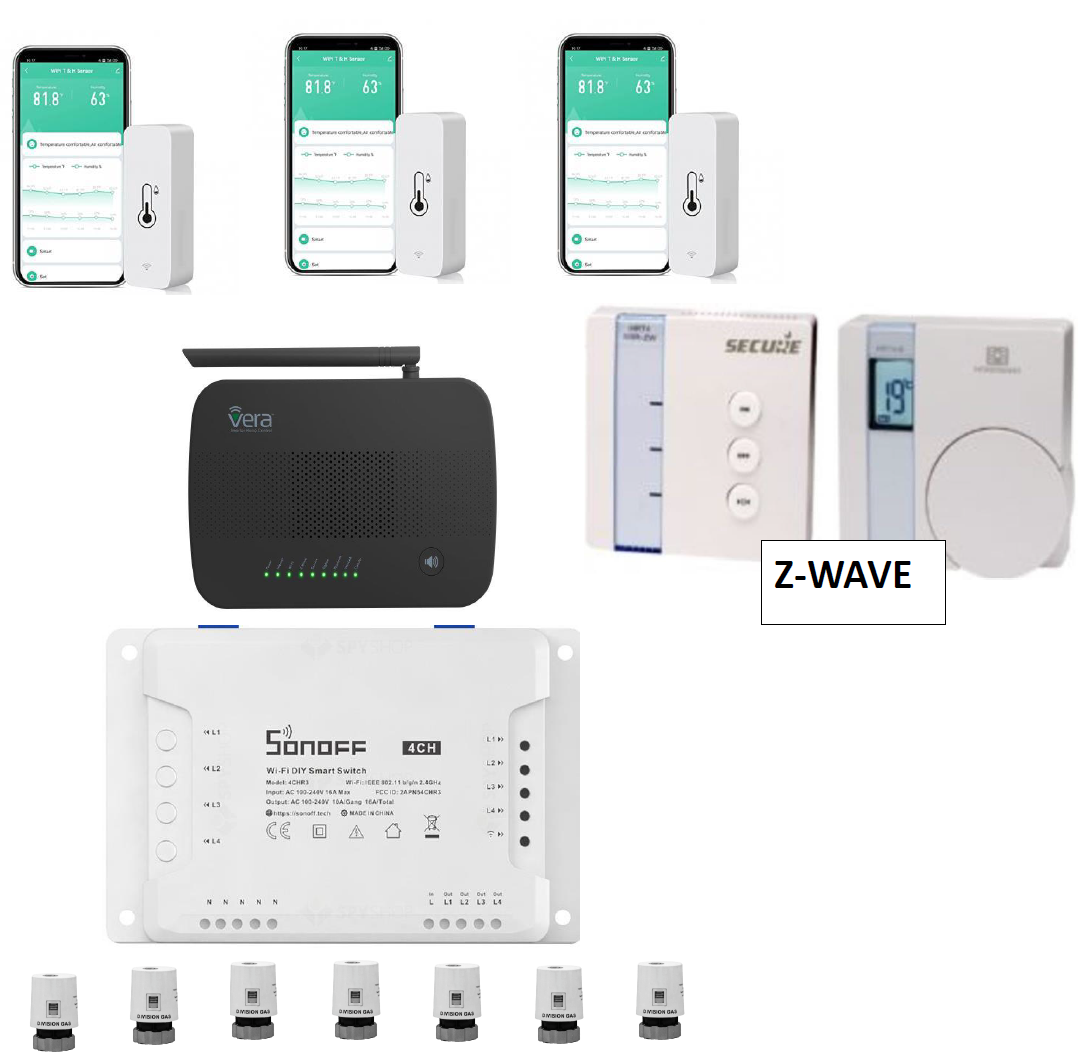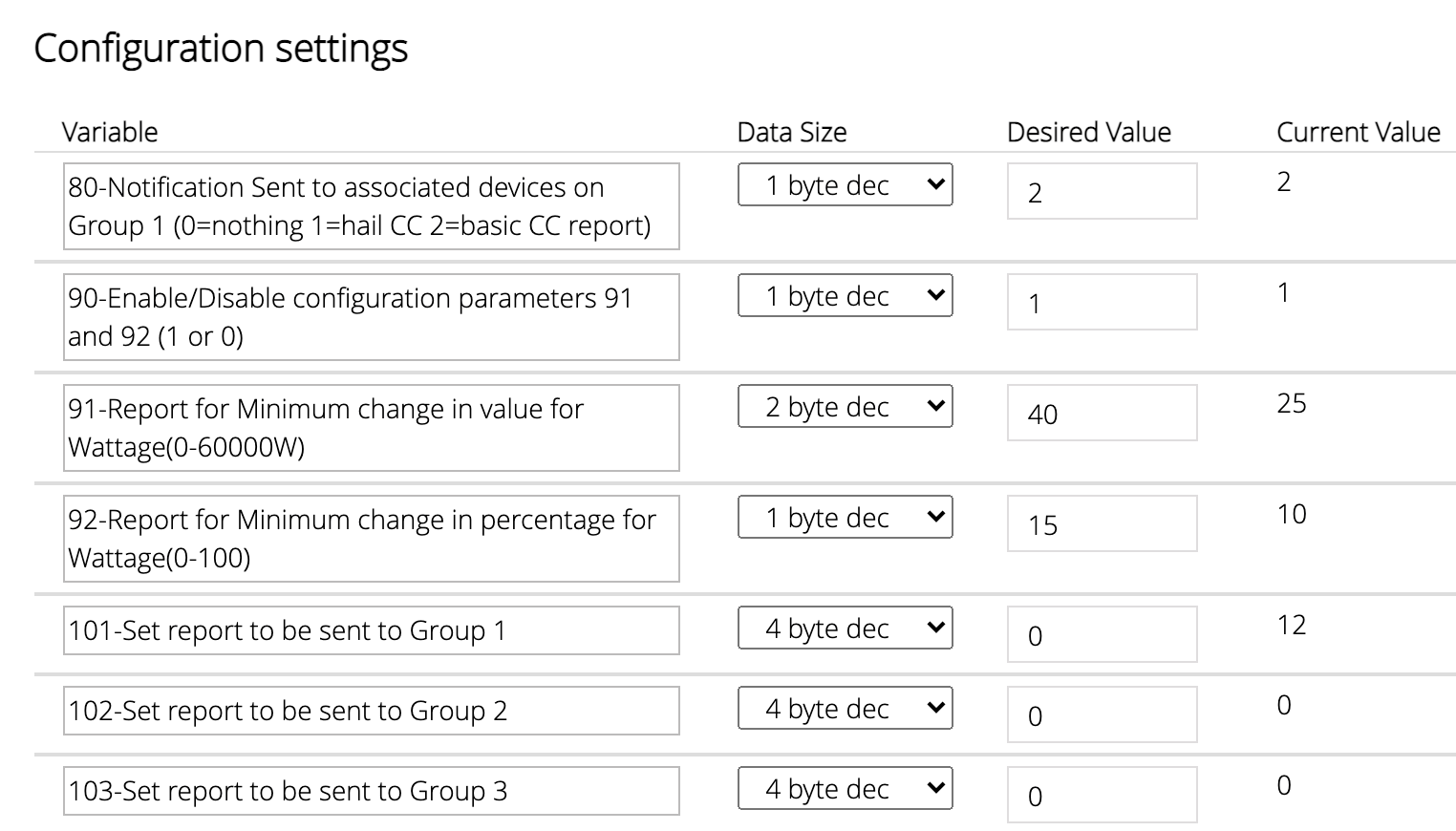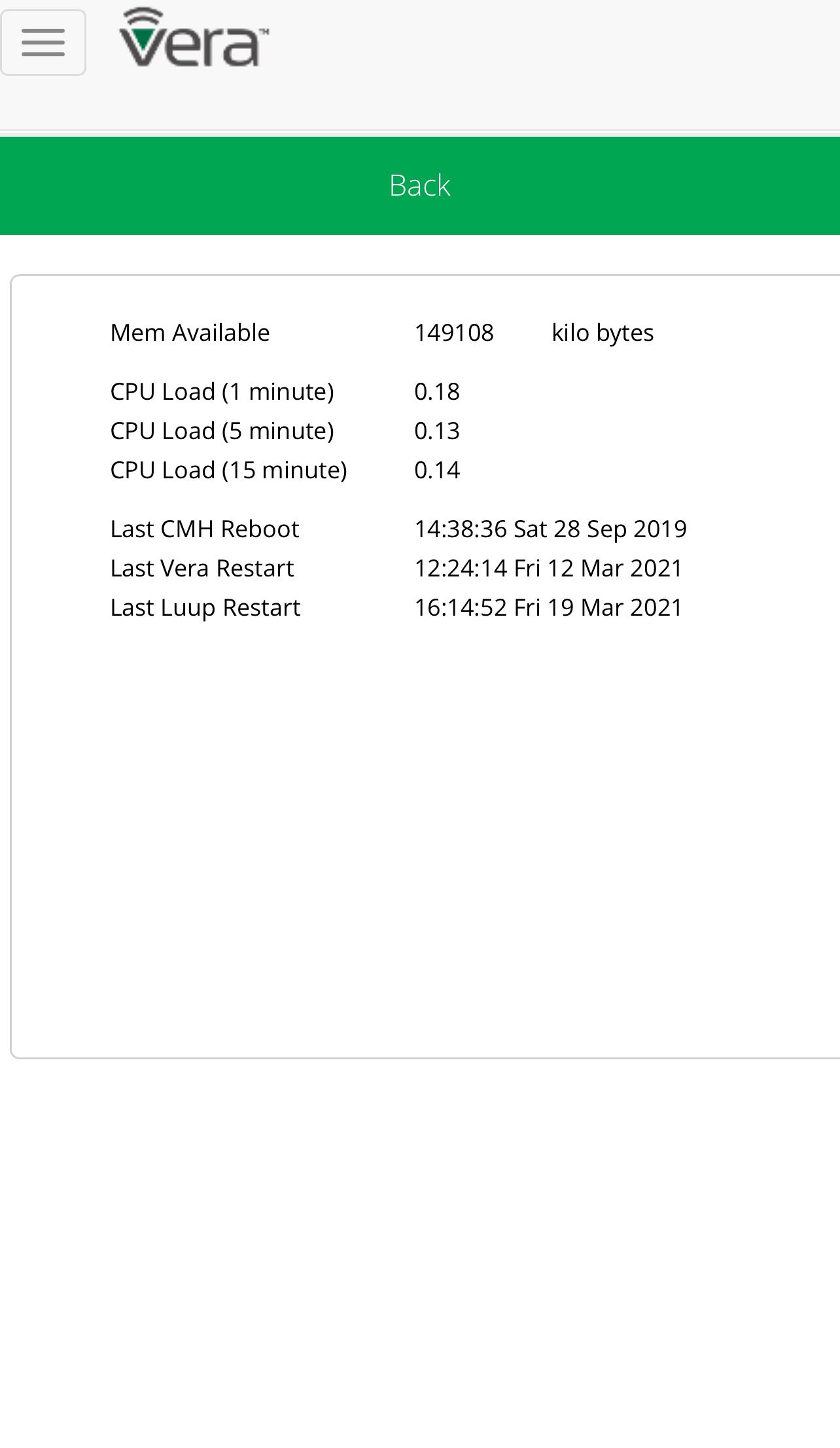Vera firmware 7.32 beta
-
Anyone else notice a significant bump in Vera's resting CPU usage after upgrading to 7.32?
Mine is chugging along at 0.20 (according to System Monitor plug-in), peaking at 0.37(!), way up from around 0.06 at rest before the upgrade.
Thoughts as to why this 3-7x increase might be happening? Just curious.At least "Available Memory" is improved from a base of 182k (with 8 Reactors active) or 192k (all Reactors disabled and removed) under 7.31, to a pretty constant 203k under 7.32.
UPDATE: I'll report back on this tomorrow, in case Vera is just busy downloading items in the background or shuffling around the file system somehow.
-
Anyone else notice a significant bump in Vera's resting CPU usage after upgrading to 7.32?
Mine is chugging along at 0.20 (according to System Monitor plug-in), peaking at 0.37(!), way up from around 0.06 at rest before the upgrade.
Thoughts as to why this 3-7x increase might be happening? Just curious.At least "Available Memory" is improved from a base of 182k (with 8 Reactors active) or 192k (all Reactors disabled and removed) under 7.31, to a pretty constant 203k under 7.32.
UPDATE: I'll report back on this tomorrow, in case Vera is just busy downloading items in the background or shuffling around the file system somehow.
-
On the morning of the second day, it appears that Vera has settled back down to an even lower CPU demand load than under the prior firmware. Now, I am showing a one minute rate of 0.05, which is more than acceptable. The available memory meanwhile is also holding firm at 200k. Overall this is a net improvement so I have no complaints.
-
There’s now a new flag to avoid children recreation. I’ve applied it and my system is rock solid. I updated 3-4 times for the beta. They even decoupled the engine and it’s updatable via opkg. can’t say Edward and his team aren’t working to improve things, but there are fundamental flaws for sure.
All that said, my system is quite perfect since the first build of this beta.
@therealdb said in Vera firmware 7.32 beta:
There’s now a new flag to avoid children recreation. I’ve applied it and my system is rock solid. I updated 3-4 times for the beta. They even decoupled the engine and it’s updatable via opkg. can’t say Edward and his team aren’t working to improve things, but there are fundamental flaws for sure.
All that said, my system is quite perfect since the first build of this beta.
Could you go into more depth about this? Will your code prevent multiple child devices from occurring? My VP is plagued with multiple child devices
-
@therealdb said in Vera firmware 7.32 beta:
There’s now a new flag to avoid children recreation. I’ve applied it and my system is rock solid. I updated 3-4 times for the beta. They even decoupled the engine and it’s updatable via opkg. can’t say Edward and his team aren’t working to improve things, but there are fundamental flaws for sure.
All that said, my system is quite perfect since the first build of this beta.
Could you go into more depth about this? Will your code prevent multiple child devices from occurring? My VP is plagued with multiple child devices
@pabla it will prevent children to be deleted and created after configuration. I've been lucky with that, but just run this code
-- 7.32 -- disable children delete on reconfigure luup.log('disable children delete on reconfigure: start') for k, v in pairs(luup.devices) do local var= luup.variable_get("urn:micasaverde-com:serviceId:HaDevice1", "ChildrenSameRoom", k) if var ~= nil and v.device_num_parent == 1 then -- zwave devices with children only luup.log('children delete on reconfigure disabled: #' .. tostring(k)) luup.variable_set("urn:micasaverde-com:serviceId:ZWaveDevice1", "DeleteChildrenOnReconfigure", "0", k) end end luup.log('disable children delete on reconfigure: end') -
@pabla it will prevent children to be deleted and created after configuration. I've been lucky with that, but just run this code
-- 7.32 -- disable children delete on reconfigure luup.log('disable children delete on reconfigure: start') for k, v in pairs(luup.devices) do local var= luup.variable_get("urn:micasaverde-com:serviceId:HaDevice1", "ChildrenSameRoom", k) if var ~= nil and v.device_num_parent == 1 then -- zwave devices with children only luup.log('children delete on reconfigure disabled: #' .. tostring(k)) luup.variable_set("urn:micasaverde-com:serviceId:ZWaveDevice1", "DeleteChildrenOnReconfigure", "0", k) end end luup.log('disable children delete on reconfigure: end')@therealdb Hopefully this helps my system out, ever since 7.32 every reload/device config brings new child devices.
Is there any new way we can delete multiple child devices for a parent device?
-
@therealdb Hopefully this helps my system out, ever since 7.32 every reload/device config brings new child devices.
Is there any new way we can delete multiple child devices for a parent device?
-
@pabla yes, but I think it's not easily automatable, unless they have all the same pattern in the name.
@therealdb is it possible to run code based on the device number instead? I am at about 14 child devices, so wouldn’t mind deleting them one by one.
-
@therealdb is it possible to run code based on the device number instead? I am at about 14 child devices, so wouldn’t mind deleting them one by one.
@pabla I'm not sure there's a luup method to delete objects beside calling it via HTTP, but it should be handy anyway with this script:
local yourID = put-here-your-master-id luup.log('Starting...') for k, v in pairs(luup.devices) do if tostring(v.device_num_parent) == tostring(yourID) then luup.attr_set( "embedded", "0", k) luup.log("http://ip_address:3480/data_request?id=device&action=delete&device=" .. tostring(k)) end end luup.log('Completed...')You should be able to grab the URL from the logs and call them quickly. I could add a curl command locally, but if I remember correctly, it will reload between each delete anyway... so take your time and stay hyadatrated while you'll wait for reload...
-
Guys, I think I've pinned down the most likely candidate(s) for "Things that cause my Vera to restart", and it looks to be any Reactor routine that involves changing House Mode.
I know that seems a bit outlandish, and further pinning down is required... but I've definitely taken notice of the exact times of day when a Luup engine restart occurred, and it's usually in the same time span that House Mode was changed, almost without exception.
A puzzlement. And I could of course be wrong.
Anyone else experience such shenanigans?
-
Guys, I think I've pinned down the most likely candidate(s) for "Things that cause my Vera to restart", and it looks to be any Reactor routine that involves changing House Mode.
I know that seems a bit outlandish, and further pinning down is required... but I've definitely taken notice of the exact times of day when a Luup engine restart occurred, and it's usually in the same time span that House Mode was changed, almost without exception.
A puzzlement. And I could of course be wrong.
Anyone else experience such shenanigans?
@librasun said in Vera firmware 7.32 beta:
A puzzlement. And I could of course be wrong.
Anyone else experience such shenanigans?this is frequent if you have a lot of actions attached to a mode. I've transitioned to a staged function, where things get called in sequence (ie: in small groups of 5 decices) and it improved a lot.
-
@librasun said in Vera firmware 7.32 beta:
A puzzlement. And I could of course be wrong.
Anyone else experience such shenanigans?this is frequent if you have a lot of actions attached to a mode. I've transitioned to a staged function, where things get called in sequence (ie: in small groups of 5 decices) and it improved a lot.
@therealdb said in Vera firmware 7.32 beta:
this is frequent if you have a lot of actions attached to a mode.
I recalled you saying that, so I had checked to see WHAT actions were taking place in connection with the changing Mode, and basically nothing. In fact, I only let MSR change House Mode 15 seconds after any other reactions are done.
And none of Vera's built-in "House Modes" settings (from the Dashboard) make changes to any devices.
Hmm... I'll have to keep my thinking cap on some more.
-
@catmanv2 said in Vera firmware 7.32 beta:
What happens if you change modes manually?
C
Never a problem, but I will certainly investigate. For instance, I have MSR Rules in place which (after a brief pause) cause my ecobee thermostat to match its mode to the new House Mode, and vice versa. Very thoroughly tested, but never 100% above suspicion.
-
You might also try using 3.9 stable branch Reactor. It's got some different job control features specifically for 7.32. I've run that combination on my house Vera for months now and have few reloads.
-
You might also try using 3.9 stable branch Reactor. It's got some different job control features specifically for 7.32. I've run that combination on my house Vera for months now and have few reloads.
@toggledbits if I have reactor installed from the marketplace can I grab the files from GitHub and upload those to update? I did this once I remember and everything got thrown out of whack
-
That works fine. Just follow the procedure:
- Go to the stable branch for the project on Github: https://github.com/toggledbits/Reactor/tree/stable
- Click the green "Code" button and choose "Download ZIP". Save the ZIP file to your local HD.
- Unzip the file.
- Open the Vera UI and go to Apps > Develop apps > Luup files
- Select all of the unzipped files (not the folder, the files as a group) and drag them to the "Upload" button in the UI.
The system will reload when the upload completes. You'll want to hard-refresh your browser as usual.
-
Following up since I made the above changes last week, and am happy to report NOT A SINGLE LUUP ENGINE RESTART YET!
Having minimal plug-ins installed and periodically rebooting Vera by power cycling seems to be a wise regimen to follow. I'm past thinking the "random restart" problem was induced by House Mode changes and/or too many commands issued at once, etc. -
Yeah, I think I know where their locking bug is that causes deadlocks.




